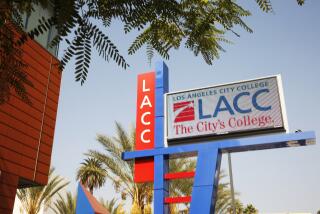Japanese Firms Fund U.S. Schools
NEW YORK — Finding that it is better to give in the United States than in their home country, Japanese corporations are pumping money into American universities for research with important commercial potential.
Japan’s Toshiba Corp., for instance, is funding work at the University of Arizona on digital radiography, which combines computer technology with X-ray equipment for detailed medical diagnoses.
And at the Georgia Institute of Technology in Atlanta, two Japanese companies are supporting development of a synthetic material that could improve catalytic converters in automobiles.
The number of Japanese-funded research projects has risen sharply in recent years despite concern in some quarters that American universities are abetting foreign competitors of U.S. industry.
Japanese corporations have turned to support of research projects and to philanthropy in the United States mainly to improve their image in this country--and because such contributions are encouraged by U.S. tax laws, unlike those in Japan.
Also, a foreign company usually supports such research in exchange for licenses to capitalize on the results. The company may even put its own employees in the laboratory to assist.
The head of the research team at Georgia Tech, Tudor Thomas, declined to discuss details of his contract with Toray Industries Inc. and Toyo Soda Manufacturing Co., each of which contributed $40,000 to his research.
Toshiba has invested $3.5 million so far in the Arizona project and has the right to market any equipment developed as a result of it, said Paul Capp, who heads the department of radiology on the Tucson campus and the research team as well.
This kind of contract worries United States industry, said Kenneth Smith, vice president for research at the Massachusetts Institute of Technology. “American businesses, especially those in electronics, are extremely wary of the competitive edge (that) any foreign companies might obtain as a result of their investments in U.S. universities,” he said.
Steve Bacon of the Research Corp. in Tucson, a nonprofit organization helping universities market results of their research, says the gap between funds needed for research and funds available is as much as $4 billion.
Capp said that it is nearly impossible to undertake a research program at a university without outside financial help and added that American as well as foreign companies were invited to bid to support his project. “They all said ‘no’ . . . except the Japanese company,” he said.
The total amount of Japanese support for research in the United States is not known, but Peter Kamura of the Japan Center for International Exchange said it amounts to millions of dollars a year. The center was set up to promote ties between U.S. organizations and business and charitable interests in Japan.
Began in 1970s With Tanaka
“You run into a lot of American university presidents in Tokyo’s Okura Hotel these days,” said Kamura, the center’s representative in New York. “They are there to set up meetings with Japanese businessmen to solicit funds.”
The procession of university administrators to Tokyo began after former Prime Minister Kakuei Tanaka visited the United States in the 1970s and gave $1 million each to 10 top U.S. universities, including Harvard, Princeton and Chicago, Kamura said.
Some schools, including MIT and Johns Hopkins, are setting up permanent offices in Tokyo to seek funding, he said. Others have established “Japan desks” on their campuses.
Georgia Tech has hired Nissho Iwaii, one of Japan’s giant trading firms, to represent the school in soliciting funds from other Japanese companies. Iwaii takes a 10% commission, according to Lowell Netherton, Georgia Tech’s vice president for research.
In addition to funding for scientific research, the Japanese also have given millions of dollars to philanthropic interests in the United States in recent years.
They are trying to improve their image and to promote cultural understanding by establishing “professorships” at universities and nonprofit foundations in the United States, said Ronald Aqua of the U.S.-Japan Foundation.
Japan registered a trade surplus of $50 billion with the United States in 1985. With protectionist sentiment rising in Congress, Japanese corporations do not want to be seen solely as “commercial exploiters,” Aqua said.
“The Japanese contribution to philanthropy in this country more than tripled in the last two years, from an estimated $27 million in the 1982-83 period,” said Craig Smith, editor of a newsletter, Corporate Philanthropy Report.
The bulk of that money goes for research projects, he said, although contributions have established Japanese-studies programs in schools at all levels, sponsored tours and student exchanges and assisted communities where Japanese companies have located facilities.
In a telephone interview from San Francisco, Smith said the size of the contributions “is remarkable when you consider (that) the concept of philanthropy is completely alien to the Japanese.”
In the United States, corporations may deduct such contributions from their income for tax purposes. In Japan, there is a 60% tax on contributions.
“The Japanese are boosting funding opportunities and spurring American corporations to give more,” Smith said. “It is one kind of competition most Americans should welcome.”
More to Read
Inside the business of entertainment
The Wide Shot brings you news, analysis and insights on everything from streaming wars to production — and what it all means for the future.
You may occasionally receive promotional content from the Los Angeles Times.










